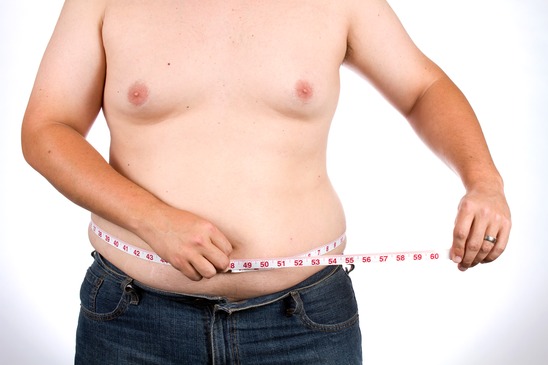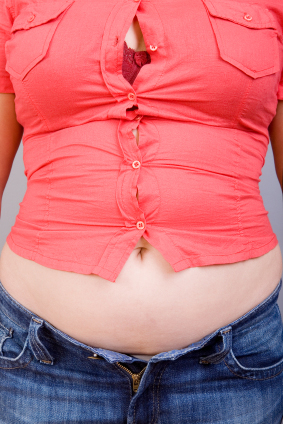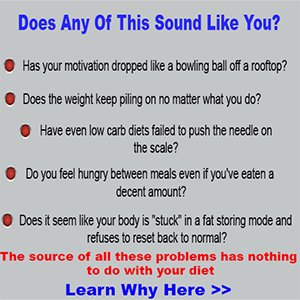The Simple Steps You Need To Take Your Weight Loss To The Next Level
 I had a client who wanted to lose 20 pounds.
I had a client who wanted to lose 20 pounds.
We adjusted her eating…we made changes to her exercise program...all in the hopes that she would lose that last 20 pounds she needed.
She went to work…
She ate clean…exercised daily…and started to see some results on the scale.
As she got closer to her goal weight, we both started to notice something:
It was getting harder and harder for her to fight the cravings and continue to lose the remaining FIVE pounds.
She started to get frustrated…she started to get angry…she even got a little depressed.
No matter what she did, she couldn’t manage to keep the weight off.
Does this sound familiar?
Editor's Note: Do THIS Twice a Day To Incinerate Belly Fat (takes 2 seconds)
Turns out, according to a new research study, her very OWN body was putting up a defense and trying to keep her at a certain weight!
I know it sounds crazy, but it’s true! So, if you’ve been struggling to lose weight—and keep it off—then you could be in the same situation.
Take a look…
Hunger Hormones and Weight Loss
Your fat cells are pretty amazing. Not only are they able to take on excess energy and store it for later use, but they are also able to produce metabolism-boosting hormones as well.
But that’s not all they produce. They also produce a hormone called Leptin, which is considered one of the “hunger hormones,” and decreases your appetite.
Now, besides Leptin, there is another hormone that your body produces that keeps you hungry. And that is Ghrelin.
Ghrelin acts in the opposite of Leptin, stimulating your appetite and making you hungry all the time. It also plays a role in maintaining body weight.
So, how does Ghrelin impact your weight loss?
 Well, when you are overweight—even by five to ten pounds—your body starts to produce MORE Leptin in order to try to slow down the weight gain.
Well, when you are overweight—even by five to ten pounds—your body starts to produce MORE Leptin in order to try to slow down the weight gain.
However, your body doesn’t really listen to the increase signal—called Leptin resistance—so you continue to eat more.
When you start to lose, though, your Leptin levels start to drop…
…but your Ghrelin levels may start to climb! And this could make you feel hungry—all the time!
And that’s exactly what the researchers found!
They noticed that when people started to lose weight, their Ghrelin levels spiked by a whopping 23 percent!
Naturally, this would lead to hunger spikes and could easily railroad your diet, since you always have the need to feed yourself.
You can thank your body for its natural instincts and trying to keep you at a weight it thinks is normal!
And all those extra calories could end up causing more weight gain!
Tip: One way to sqaush hunger spikes would be to better control your blood sugar levels. One way to do this is = = > Grab Gluco Guardian--the only way to destroy foods cravings and control your blood sugar!
But there is good news: As the subjects continued on their weight loss journey, their Ghrelin levels started to DROP!
In fact, after just one year of maintaining their weight loss program, the subjects' Ghrelin levels DROPPED to just SEVEN percent!
Talk about making it easier to control your appetite! And, according to other research, as your weight levels drop, your Leptin levels start to drop as well!
The combination of both Leptin and Ghrelin decreasing could make it easier for you to lose—or maintain—your weight loss!
Plus, as you lose weight, you may have an increase in two important hormones—GLP-1 and PYY3-36.
These two hormones may actually boost your satisfaction and feeling of fullness after a meal. According to the study, as the year went on, these two hormones started to climb!
This is important as they boost your feelings of satisfaction after a meal and could keep you from eating more!
Tips For Reducing Ghrelin
As you know, Ghrelin is the “hunger-hormone,” which means if you have more of it, you’re going to be hungry and stay hungry.
Typically, it peaks right before a meal and settles back to normal levels about an hour after. If you’re overweight, than your signal may not be strong enough, which could lead to issues with hunger and overeating.
But:
You don’t have to spend the rest of your life hungry all the time. Here are some brilliantly easy tips for reducing ghrelin and keeping your hunger under control.
Are you ready for them?
1. Avoiding Sugar
I know this may be a hard one for some people, but avoiding sugar will do a world of good for you—and your hunger levels.
Not only does sugar target your brain, making you crave this fluffy white powder even more…
…excess sugar has also been linked to impairing your ghrelin levels.
And this won’t be good for your hunger. So stop drinking sugar-sweetened beverages (soda, juice, etc.) and skip out on foods that may contain added sugar.
2. Include More Protein
Brah, you need more protein. All meathead comments aside, protein has been linked to lowering ghrelin levels and balancing out your hunger.
More:
Protein is great for building lean muscle mass, which expends calories, which helps you lose weight.
And this, in turn, could optimize your ghrelin levels, therefore cutting down on your hunger.
Also, protein has been linked to increased feelings of satiety, which is a fancy term for ending hunger pangs and preventing you from overeating.
So how do you go about putting these things into practice?
Drum roll please….
Low-calorie, high-protein snacks will do it every time.
Not only are you fueling your body with the nutrients it needs to keep ghrelin under control (protein, and fast-acting carbs), you’re also going to boost your metabolic rate.
And the faster your metabolism is, the easier it may be to lower your weight. Some great examples of low-calorie snacks options include:
 Apples and peanut butter
Apples and peanut butter
Cut up veggies and hummus
Low-carb protein shakes (like our JayLab Pro Protein that has 24 grams of protein and less than 2 grams of carbs.)
Berries and yogurt
Melon (cantaloupe, honeydew, and watermelon) and cottage cheese
You get the picture. These snacks should ease hunger pangs during the mid-morning or mid-afternoon lull time, boost your metabolism, and control that pesky hormone ghrelin, therefore helping to keep you on track.
Take Home Message
There are a lot of factors that play into your ability to lose or maintain your weight loss.
But one factor, the production of “hunger hormones,” could play a much more important role in your ability to lose or maintain your weight.
According to new research, the hormone Ghrelin (appetite stimulator), could increase in the first few weeks to months after you start to lose weight.
But, Ghrelin production may level off—even DROP—after a year of weight loss or weight maintenance.
And you may have an increase in two potent hormones that keep you feeling full after a meal!
So, if you’ve been struggling to lose weight—and you’re frustrated by it—you could be experiencing changes in the hormone levels that impact your appetite.
But, if you stick to your program—keep eating right and exercising—then you may be able to lower the production of those hormones, which could keep your weight loss on track!
References:
Lepsen EW, Lundgren J, Holst JJ, Madsbad S, Torekov S. Successful weight maintenance includes long-term increased meal responses to GLP-1 and PPY3-36. Eur J Endocrinol. 2016 June.
About Jayson Hunter & Jaylab Pro

Jaylab Pro was founded by Registered Dietitian Jayson Hunter. Jayson has been recognized as one of America's foremost weight loss experts by America's Premier Experts™. He has also been featured in USA Today for this accomplishment. Jayson is also a best-selling author having co-authored multiple books in health & fitness and business growth. Jayson and the Jaylab Pro team are proud to create content that helps improve the lives of millions of people around the world. We hope you enjoy it just as much as others have.
 If you order a JayLabPro SmartShip product or any Combo Package, we will automatically ship you a new supply of the product or products you have ordered every month, starting 30 days after your initial order is shipped, and continuing until you cancel. The credit card you are using today will be billed the lowest available price for those product or products when your order is shipped, but shipping will be FREE. You may log into your customer account or call our customer service department toll-free at 1-888-9GETPRO (1-888-943-8776) between the hours of 8am – 9pm EST Mon-Fri to cancel future shipments, customize the timing of your shipments, or change the credit card used for billing.
If you order a JayLabPro SmartShip product or any Combo Package, we will automatically ship you a new supply of the product or products you have ordered every month, starting 30 days after your initial order is shipped, and continuing until you cancel. The credit card you are using today will be billed the lowest available price for those product or products when your order is shipped, but shipping will be FREE. You may log into your customer account or call our customer service department toll-free at 1-888-9GETPRO (1-888-943-8776) between the hours of 8am – 9pm EST Mon-Fri to cancel future shipments, customize the timing of your shipments, or change the credit card used for billing.










